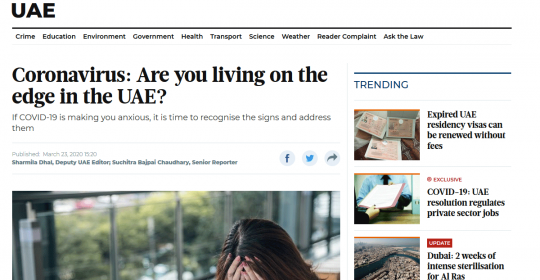
COVID19 Anxiety – Psychologist, Alfred Gull, in Gulf News
Is the novel coronavirus scaring the living daylights out of you? Do you constantly wonder what’s going on and where it is all leading? Do you fear the words quarantine, isolation and lockdown? Have you rushed to the supermarket in anticipation to stock up on your groceries?
Well, if the answer is yes to any of these questions, you are not alone.
As news about COVID-19 takes over not just prime time on television but also every sphere of public and private life, the impact it is having on our minds is also becoming a subject of deep concern. […]
According to Alfred Gull, clinical psychologist at the German Neuroscience Centre in Dubai, an increasing number of patients, including teenagers, are coming to him with signs of anxiety.
Sense of deprivation
“How long will this continue, what happens to my plans? This is what most patients ask as they grapple with the COVID-19 outbreak. Teenagers especially are feeling a sense of deprivation. On the one hand, they are being kept away from physically mingling with friends and classmates; on the other there are stringent rules at home, limiting their time spent on the Internet.”
Gull, who recommends that the Internet time rules be relaxed under these trying circumstances, said, “Children should be encouraged to stay in touch with their friends online as they need to talk and share their feelings. Parents are working from home these days and they can monitor their children’s online activities and prevent any misuse.”
He said for youngsters, and many adults too, the sense of uncertainty and insecurity around them is directly connected with their own identity, as a result of which the changed circumstances of their lives seem “catastrophic”. And without their even realising it, they begin to feel anxious.
The signs of anxiety range from over-thinking and worrying to physical symptoms like a high high rate, numbness in the limbs, palpitations and shortness of breath. Often, people with anxiety can’t sense it and see a number of doctors before being referred to a psychologist.
The psychologist then evaluates the patient after a detailed session and employs various techniques to calm them down. “The aim is not erasing this anxiety but deal with the situation at hand by focusing on the minutest details and enjoying the small things in life under our changed circumstances. There is a series of things you can do to overcome the challenge.” […]
The original and full article was published in Gulf News

